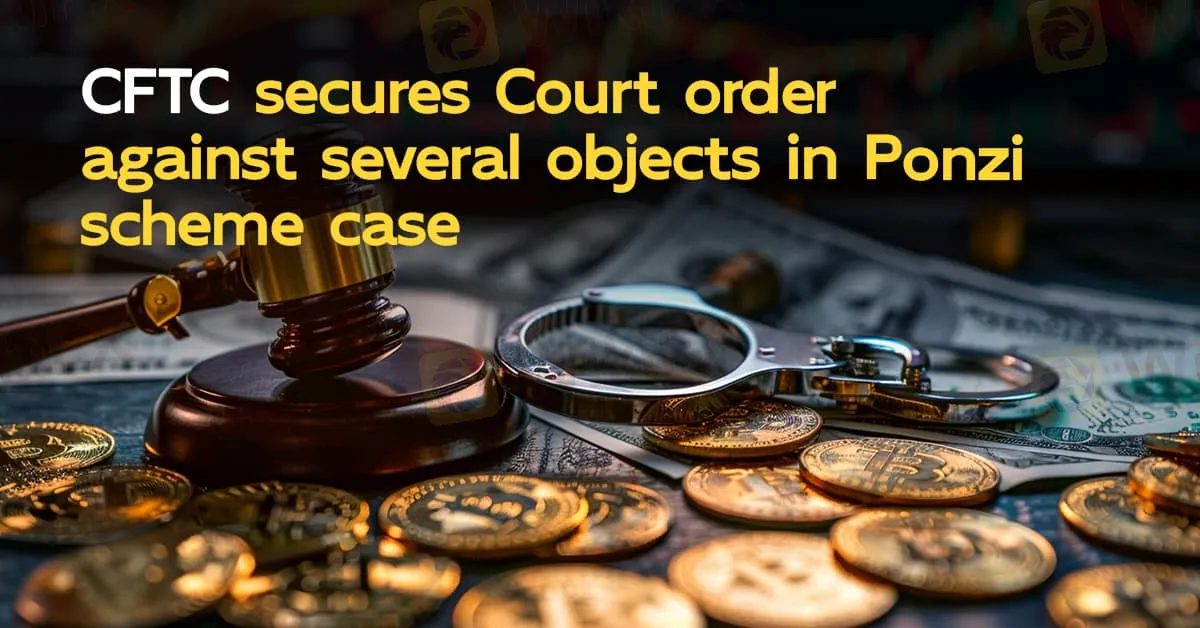简体中文
繁體中文
English
Pусский
日本語
ภาษาไทย
Tiếng Việt
Bahasa Indonesia
Español
हिन्दी
Filippiiniläinen
Français
Deutsch
Português
Türkçe
한국어
العربية
CFTC secures Court order against several objects in Ponzi scheme case
Abstract:The Commodity Futures Trading Commission (CFTC) has achieved a significant legal victory in a case against Sam Ikkurty, Jafia, LLC, Ikkurty Capital, LLC, and related entities. Judge Mary Rowland of the Illinois Northern District Court granted a summary judgment in favor of the CFTC, ruling on all counts of the complaint.

The Commodity Futures Trading Commission (CFTC) has achieved a significant legal victory in a case against Sam Ikkurty, Jafia, LLC, Ikkurty Capital, LLC, and related entities. Judge Mary Rowland of the Illinois Northern District Court granted a summary judgment in favor of the CFTC, ruling on all counts of the complaint.
The court order, announced today, mandates substantial financial repercussions for the defendants. Sam Ikkurty of Oregon, along with Jafia, LLC and Ikkurty Capital, LLC, operating under various names such as Rose City Income Fund I, Rose City Income Fund II, and Seneca Ventures, LLC, faces a combined restitution and disgorgement totaling more than $120.6 million. This includes over $83.7 million in restitution and $36.9 million in disgorgement, jointly and severally.
The judgment stems from allegations that the defendants orchestrated a Ponzi scheme, deceiving investors through false promises and misrepresentations. According to the CFTC, Ikkurty attracted participants through webinars and trade shows, enticing them with guarantees of a 15% annual income from investments in digital asset commodities like Bitcoin and Ethereum, as well as commodity interests.
Judge Rowland's order affirms that these representations were misleading, with Ikkurty failing to deliver any actual profits to investors. Instead, funds were allegedly misappropriated, including through a dubious carbon offset program where promised collateral was not obtained, resulting in significant financial losses for participants.

In addition to the financial penalties, the defendants were found to have violated the Commodity Exchange Act (CEA) and CFTC regulations, including operating as unregistered commodity pool operators. The court emphasized that digital assets like Bitcoin and Ethereum fall under the CFTC's regulatory purview, extending to other virtual currencies such as OHM and Klima.
The CFTC cautioned that while orders for restitution aim to recover lost funds for victims, the complex nature of Ponzi schemes often means that full recovery may not be possible if perpetrators lack sufficient assets.
The outcome underscores the CFTC's commitment to protecting investors and maintaining integrity in commodity markets, signaling a stern stance against fraudulent schemes within the digital asset sector.

Disclaimer:
The views in this article only represent the author's personal views, and do not constitute investment advice on this platform. This platform does not guarantee the accuracy, completeness and timeliness of the information in the article, and will not be liable for any loss caused by the use of or reliance on the information in the article.
Read more

Forex Hedging: Is It a Trader’s Safety Net or Just an Illusion?
In the volatile world of forex trading, risk is inevitable. One widely used strategy is forex hedging, which is a useful technique designed not to eliminate risk entirely, but to reduce its potential impact. As global economic uncertainty persists, understanding how hedging works could be an essential addition to a trader’s toolkit.

OctaFX Back in News: ED Attaches Assets Worth INR 134 Cr in Forex Scam Case
The Enforcement Directorate (ED) in Mumbai has attached assets worth around INR 131.45 crore. This included a luxury yacht and residential properties in Spain. Read this interesting story.

Is forex trading profitable?
Many traders think that forex trading can make quick profits, but the truth is more complex. While some people do make money in the forex market, others fall prey to its many pitfalls because, in this industry, the scams and misleading promises are widespread.

Admiral Markets: A Mix of Regulation and Risk
Despite multiple licenses, Admiral Markets presents potential red flags that traders should not ignore, including a suspicious clone alert and disclosure by Malaysia’s Securities Commission.
WikiFX Broker
Latest News
He Thought He Earned RM4 Million, But It Was All a Scam
CryptoCurrency Regulations in India 2025 – Key Things You Should Know
OctaFX Back in News: ED Attaches Assets Worth INR 134 Cr in Forex Scam Case
Trump inaugural impersonators scammed donors out of crypto, feds say
Ethereum is powering Wall Street's future. The crypto scene at Cannes shows how far it's come
Forex Hedging: Is It a Trader’s Safety Net or Just an Illusion?
US debt is now $37trn – should we be worried?
OPEC+ members agree larger-than-expected oil production hike in August
Top Wall Street analysts are pounding the table on these 3 stocks
Dukascopy Ends EOS/USD Trading Amid Liquidity Issues
Currency Calculator


